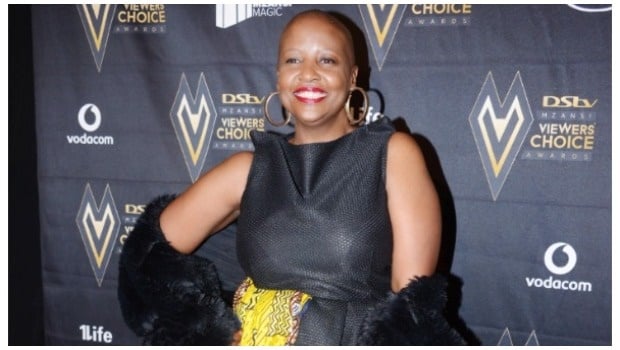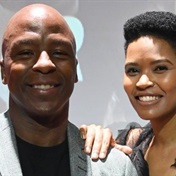
Years of self-loathing, plenty of broken relationships, months of dabbling in drugs and alcohol and an abortion – this is what she went through before she learned to love herself. These days she knows her black skin is beautiful, her culture is wonderful and not all black men will rape and hurt her.
Actress and activist Rosie Motene, 43, has endured many painful lessons on her journey to discovering her true African self. And it’s this journey she’s sharing in her new memoir, Reclaiming the Soil – a story of how a black woman first processed and then abandoned the things she’d been raised to believe. It’s her life story, Rosie tells us when we meet at the Rosebank offices in Joburg where she runs her Waka talent agency, which represents entertainers from East and West Africa.
Born during apartheid to a domestic worker mother, Jacobeth, and petrol attendant father, Pathe Motene, she ended up living a privileged life.
READ MORE: Do you call the woman who cleans your office space, your colleague?
Her mom worked for a Jewish family as a live-in domestic in Emmarentia, Johannesburg, while the rest of the Motene family lived with grandmother Gogo Nthipe in Phokeng, Rustenburg.
“When I was born, the agreement was I’d stay with my parents for three months and then move to Phokeng to live with my grandmother,” Rosie says.
“But the white family fell in love with me. I was their new toy.”
So she was allowed to stay on with her parents. “On special occasions I was allowed to stay with the family in the house until I finally got my own room in the house and I grew up as one of their own.”
The family unofficially adopted Rosie and paid her school fees.
“The family took me in, which was a privilege as I got the best education.”
But there was a downside, she adds. “That also meant I couldn’t learn my Tswana tradition and I would adopt the ‘white culture’.” The former Generations actress couldn’t speak or understand Tswana growing up and hardly ever went home to her granny.
“All I saw growing up was that white was right,” she says.
“I was told not to go to Soweto or speak to black men as they’d hurt or rape me. At times At times I’d pray and ask God to make me wake up as a white girl so I can fit in and have ‘perfect' hair. That was my life.” And that’s how her identity crisis was born.
Chris Hani’s death was Rosie’s wake-up call, the reason she decided to embrace her black culture. Before 1993, she’d believed everything she was told about black people. And then Hani, the leader of the South African Communist Party, was assassinated outside his home in Dawn Park, Boksburg, while Rosie was on holiday with her white family in Plettenberg Bay.
“All the white people went into a frenzy saying that the ‘terrorist had been killed’ and they needed to get out of the country.” Some families moved to the UK, others to Australia. Rosie’s foster parents decided to move to Israel.
“I couldn’t understand why the death of this black man struck fear into the hearts of so many white people. There was no internet, our lives didn’t involve politics and I didn’t know much about the history of South Africa so I was fascinated by the frenzy.” Rosie was sent to live with her foster brother.
She struggled to fit in with his friends, felt lost and out of touch with her identity and knew she needed to find herself, so she went to live with her parents in Phokeng for 18 months. She learnt to speak Tswana although “I still sound like a white person and people laugh when I try to speak it,” she admits.
READ MORE: Has Meghan Markle changed her accent? People debate her 'new British accent'
Her identity crisis extended to her relationships, Rosie shares. She recalls how, in Grade 12, she met a young man named David from Rwanda and dated him for nine months. He was physically and emotionally abusive but due to her self-esteem issues she was grateful he found her attractive.
Rosie got pregnant with his child. “I kept it quiet until the day he really beat me. My brother took me to hospital.”
She was less than 12 weeks pregnant but abortion was still illegal in SA. “My doctor advised I see a psychologist, who deemed me unfit to be a mother so I could get an abortion.”
Although she wasn’t in a position to care for a child, she still had to learn to forgive and love herself again, she says, which took years of therapy.
Rosie took 12 years to write her memoir, working on the manuscript in between building her career as an actress.
After leaving Generations in 2004 after four years of playing journalist Tsego, she worked on various series and movies, including Hotel Rwanda and M-Net’s Studio 53.
But it’s her work as an activist for nonprofit organisation People Opposing Women Abuse (Powa) that’s given her the most fulfillment. She first started working with Powa in 2003 as a trainee in the public awareness and volunteer programme. She then started working for the NGO in 2004 after she gave a talk to 15 000 sexual offenders at the headquarters of the Gauteng department of correctional services, and she’s never looked back. Today she sits on the board of Powa.
“My main focus is for women to talk about sexual harassment in the entertainment industry and to get counselling.”
READ MORE: 3 people share their sexual harassment stories - but what does the law say? (TRIGGER WARNING)
After years of self-doubt, Rosie, who is single, loves herself without reservation and is open to falling in love, she says. It has taken a lot of work to get to where she is today yet she can’t help but remember the days she almost went down the wrong path while still a student at the University of the Witwatersrand.
“My ancestors pulled me out of the depths of many situations,” she says.
“There was a time in university when I was doing drugs and drinking every night. I could have gone down that dark alley but I didn’t.”
Embracing her true identity helped her get out of the hole. “I hated my skin because of the things I was taught. I had put my black family on the back burner and I had no identity.”
Rosie feels she disrespected her biological mom. She never called her anything but Boomba growing up. “That was a nickname the white family gave her – because she was fat.”
Therapy – and writing her book – helped her heal. It taught her the importance of knowing your true identity.
“It taught me that everyone needs time to reflect on their lives and to heal, and that as black women we are told not to speak loud. But our voices have power.”
And Rosie has certainly found hers.


















